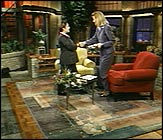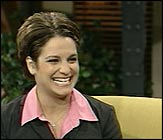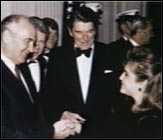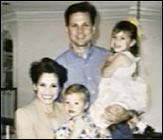
Mary Lou Retton: All About Lou
CBN.com - It was 1984 when Mary Lou Retton vaulted onto the Olympic scene and made a perfect landing in our hearts. Today this gold medal champion continues to inspire millions worldwide with her winning approach to life. In her new book Gateways to Happiness she shares her proven secrets for success.
Mary Lou Retton, who is six months pregnant with her third child, shared her winning ways with Lisa Ryan.
LISA RYAN: You have so many wonderful accomplishments to your name. Let me just name a few. I wrote them down because I thought, I'll never remember all of this: first American woman to win a gold medal in gymnastics, the first gymnast and youngest inducted into the Olympic Hall of Fame, first woman to appear on a Wheaties box. What was it like for a young girl from West Virginia to suddenly become a worldwide celebrity and America's sweetheart?
MARY LOU RETTON: You know, I think back, and I have to kind of laugh, because I won my medal for the Olympics on a Friday night. Saturday morning the headlines said, a star is born overnight. I kind of chuckle because I think, where did the nine years go that I put into this. A good friend, Michael Jordan, said fame doesn't change you. It just changes the people around you. It's really true. I am still the same Mary Lou pre-Olympic that I was after I won the gold medal. It was definitely a life-changing experience.
LISA: When did you know that you wanted to pursue gymnastics?
 MARY LOU: I was eight years old watching the 1976 Olympics in Montreal and totally glued to the TV set watching Nadia Comaneci. I mean, she was my gymnastics role model. I think I was actually doing a split watching, practicing my gymnastics. I said to my mom, 'I'm going to go to the Olympics one day. I'm going to win the Olympics.' She patted me on the shoulder and said, 'Sure, honey. Sure.' But as a kid, that's all it was was a dream and a fantasy. But that was really when the seed was planted in me.
MARY LOU: I was eight years old watching the 1976 Olympics in Montreal and totally glued to the TV set watching Nadia Comaneci. I mean, she was my gymnastics role model. I think I was actually doing a split watching, practicing my gymnastics. I said to my mom, 'I'm going to go to the Olympics one day. I'm going to win the Olympics.' She patted me on the shoulder and said, 'Sure, honey. Sure.' But as a kid, that's all it was was a dream and a fantasy. But that was really when the seed was planted in me.
LISA: But then you went on to pursue it. You really dedicated yourself to it at like age 12 and by age 14 you were given an opportunity to go to Houston, Texas, and to train with the renowned coach there. But it meant moving away from your family. You made some incredible sacrifices.
MARY LOU: I certainly did. And people always ask me or say to me, 'Boy, the sacrifices must have been incredible.' I say, 'Yes, they were for me.' But now as I look at the situation as a parent, I think to myself, wow, my family, my mother and father made the sacrifice. They let their 14-year-old daughter move halfway across the country to train with, at that time, and he still is, I believe, the king of gymnastics, the man who coached my role model, Nadia Comaneci. But the Lord gave me that opportunity and I really felt very strong, and we weighed the pros and cons and decided to give it a shot. Even at 14, I remember telling my parents, I didn't want to be wondering the rest of my life what could have been, what if, so I wanted to give it a shot.
LISA: What was the training schedule like for you?
MARY LOU: Well, it was quite difficult. Two years prior to the Olympics, our daily schedule was 7:00 to 11:00 in the gym every morning. We would shower at the gym, go to school for a few hours and then back to the gym from 5:00 p.m. to 9:00 p.m. every single day. So it was eight hours every day. It was a job.
LISA: How did you fit schooling around that? Were you home schooled?
 MARY LOU: When I moved to Houston, I was in the ninth grade. I was a freshman in high school. There was a Christian school near the gym that really helped us with our schedules. We were only going for a couple of hours. They gave us credit for P.E. Imagine that. Eight hours a dayI would hope!
MARY LOU: When I moved to Houston, I was in the ninth grade. I was a freshman in high school. There was a Christian school near the gym that really helped us with our schedules. We were only going for a couple of hours. They gave us credit for P.E. Imagine that. Eight hours a dayI would hope!
LISA: You better get credit!
MARY LOU: I know. Exactly. They should give me a degree by the end of it. My tenth grade year, which was my Olympic year, I was home schooled.
LISA: Do you think that all of that sacrifice and the discipline has paid off? Do you see that it's paid off even over your life, not just for the goal itself?
MARY LOU: Absolutely. All that I learned in my athletic career, in my gymnastics training, the perseverance, the determination, the sacrifice, the hard work ethic. I think that's a big problem today in our society, especially with our young people. Nobody wants to earn anything anymore. They want everything just to be given to them. I wasn't brought up that way. My gymnastics training really taught me, especially now as a working mother with a very hectic schedule, it helps me every day.
LISA: How did your faith hold you through all of this? You talked about your family. But you were raised a devout catholic, in a really strong, religious family. How did that hold you through this?
 MARY LOU: I wouldn't be where I am today without my relationship with God. My relationship with Jesus Christ is so much stronger now, but then, I mean, I knew He gave me talent and I knew that He brought Bela Karolyi into my life to bring that talent out. I give Him all the glory. He gave me something, I worked for it, but I just praise Him every day for what He has in store for me, my plan. He has a purpose for all of us. And I think winning that gold medal and putting me in that public arena was just a small little step of what He has in store for me. I really believe that.
MARY LOU: I wouldn't be where I am today without my relationship with God. My relationship with Jesus Christ is so much stronger now, but then, I mean, I knew He gave me talent and I knew that He brought Bela Karolyi into my life to bring that talent out. I give Him all the glory. He gave me something, I worked for it, but I just praise Him every day for what He has in store for me, my plan. He has a purpose for all of us. And I think winning that gold medal and putting me in that public arena was just a small little step of what He has in store for me. I really believe that.
LISA: We talk about the fact that you're six months pregnant and you have two little girls at home. Do you know what you're having?
MARY LOU: No. Only God knows.
LISA: You'll be surprised?
MARY LOU: I'd like a boy though, God, if you're listening.
LISA: Three girls are wonderful.
MARY LOU: I know. I know.
LISA: My husband says you know you're outnumbered when the largest laundry load is the pink load.
MARY LOU: I love that.
LISA: How do you manage home and family and career? You're out promoting a book. How do you manage all of that?
 MARY LOU: Just like you and every other working mother out there, it is a daily struggle. I pray every single day, all day long about it, organization, preparation and my key, of course, my husband. He's wonderful. We have a joke in the Kelly household (that's my married name) that I win a gold medal every day in his eyes. He's shining, my soul mate. I love him more today than I did when I married him. He really steps up to the plate when I'm gone. It's just being organized and having a good team of support people to help you.
MARY LOU: Just like you and every other working mother out there, it is a daily struggle. I pray every single day, all day long about it, organization, preparation and my key, of course, my husband. He's wonderful. We have a joke in the Kelly household (that's my married name) that I win a gold medal every day in his eyes. He's shining, my soul mate. I love him more today than I did when I married him. He really steps up to the plate when I'm gone. It's just being organized and having a good team of support people to help you.
LISA: Got to have those new millennium dads.
MARY LOU: Absolutely. You know you do.
LISA: We've been talking mommy stuff and gymnastics. Let's talk about the book. One of the things that you are so well known for is your signature smile. You light up a room when you come in. People would look and say, 'Of course, she has success: Olympic gold medal winner, family. Why wouldn't she be happy?' Some people are facing really difficult circumstances. But you say anybody can be happy.
MARY LOU: And I believe that anybody can be happy. I think that people choose to be miserable. I really believe that. I get that every single day, 'Sure, you're Mary Lou Retton. You should be happy. You're famous. You've got a gold medal at home.' But these aren't my gateways that I list in my book. I talk about family, I talk about my faith, relationships, attitude, discipline, health, laughter. My first gateway isn't that big brand-new house I have or the red Ferrari. Those things don't make you happy. Fame and fortune don't make you happy. That smile that people see that I am famous for comes from a place deep inside of me. And I truly am happy and I think that I can coach people to find that happiness if they choose to be happy. They have to want it. It's hard work.
LISA: I love the way you say you can coach them to be happy through these principles and those are principles that you have really learned and been coached in as well.
MARY LOU: I have. And that was a big struggle in my life. From the age of 7 or 8, I always had that coach. I always had the Bela Karolyi telling me where to go, how many times to do it, was it good enough. And then I retired from gymnastics at 18 and I was on my own. I didn't have the person in back of me with that stamp of approval. That was a difficult time for me. Now I've passed through that. That was a journey for me. I'm a coach now to my kids. I think I can coach people to happiness through my book.
LISA: That's great. One of the things you say in your book Gateways to Happiness is this: 'If you're happy, the world around you becomes a happier place. People respond to you more positively and all of a sudden, the problems you thought you could never solve, begin to get fixed.'
MARY LOU: Absolutely. It's all in attitude. We can control our attitude. We cannot control the external conditions -- the sitter doesn't show up and you're going, 'But I've got to go to work!' -- those daily stresses. Or the more serious things like the death or illness of a loved one. Life is inevitable. It's going to hand us those things. But does that have anything to do with whether we're truly fundamentally happy? No. It's how we work through that. What do we learn from that process? There's a purpose in everything.
LISA: What's next, other than delivering your third baby?
MARY LOU: The book tour, and oh, by the way, I'll give birth.
LISA: Sometime in August?
MARY LOU: Yeah, sometime in August, I think. I have been working on a children's television show called Mary Lou's Flip Flop Shop. It's a preschool show. You have got two children that would be just right for it, Lisa. It's going to be on the FamilyNet channel starting in September and we're hoping the videos will be out this summer sometime, so look for that.




